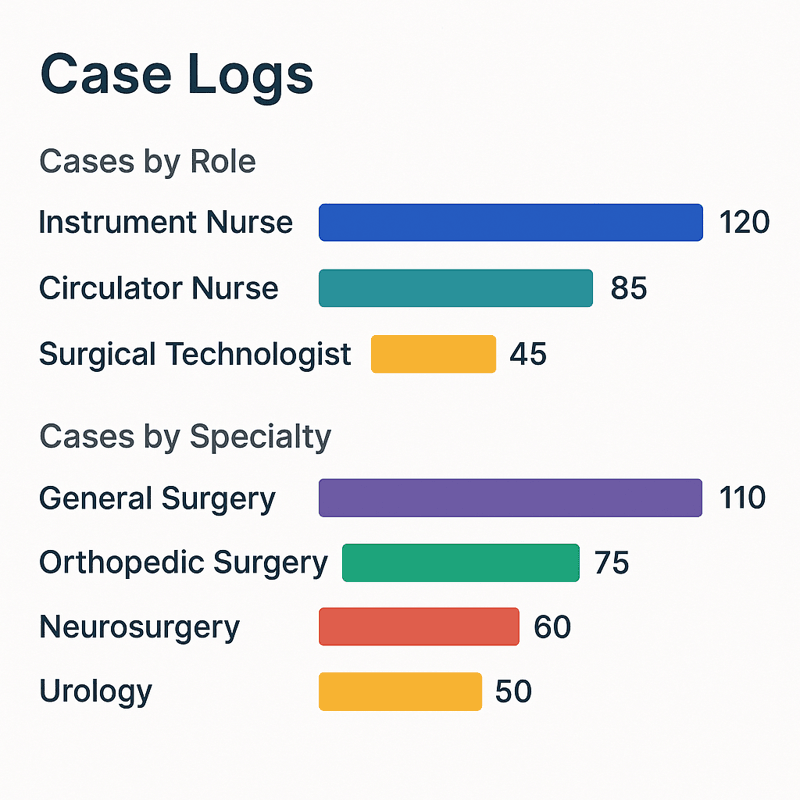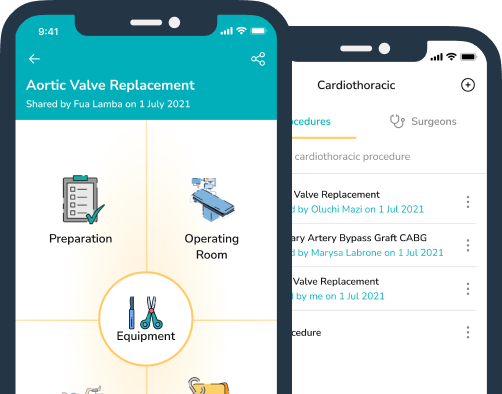Are You an Expert in Your Surgical Specialty? The Power of Tracking and Reflective Practice
Posted at 14 June 2025 in Healthcare Education by Marrianne
Introduction
In the dynamic environment of the operating room (OR), achieving expertise isn’t solely about time spent—it’s about deliberate practice, consistent reflection, and continuous learning. Roles such as Instrument Nurse, Circulator Nurse, Surgical Technologist, and Operating Department Practitioner (ODP) are pivotal, each requiring a unique blend of technical skill, clinical judgment, and experiential knowledge.
But how does one measure progress and move from competence to mastery?
The Journey to Surgical Expertise
Becoming proficient in surgical roles typically involves formal education and extensive clinical exposure. For instance, surgical technologists and nurses often complete programs combining academic study with hands-on training. However, true expertise is cultivated over years of performing, adapting, and reflecting within diverse surgical settings.
Tracking the number and variety of surgical cases handled provides tangible evidence of experience. This strengthens professional credibility, enhances clinical reasoning, and builds the confidence essential to anticipate complications and respond under pressure.
The Role of Reflective Practice
Reflective practice is a cornerstone of professional development in healthcare. It involves critically analyzing one’s clinical experiences to foster growth and improve outcomes. Evidence from NSW Health and other research institutions shows that reflective practice enhances learning, improves critical thinking, and leads to safer, more patient-centered care.
In the OR, reflective practice helps clinicians—whether they’re acting as the circulator, scrub nurse, ODP, or technologist—understand the rationale behind actions, refine processes, and collaborate more effectively as a team.
ScrubUp: Empowering Surgical Professionals
ScrubUp supports surgical professionals by offering tools to log and reflect on every procedure, by role. With ScrubUp, users can:
-
✅ Log and categorize cases by role (Instrument Nurse, Circulator Nurse, Surgical Technologist, or ODP), procedure, and complexity
-
✅ Track growth over time, identifying strengths and skill gaps
-
✅ Document reflections and key learnings after each procedure
-
✅ Generate insights and reports to support credentialing or career development
By facilitating case tracking and reflective practice, ScrubUp turns day-to-day work into measurable professional progress.
Are You Tracking Your Surgical Experience?
If you’re not logging your surgical cases or reflecting on your experience, you may be overlooking a critical tool for growth. Ask yourself:
-
🧐 How many cases have I supported in my role—circulating, scrubbing, or assisting?
-
📈 What have I learned from those experiences?
-
🚀 Where could I focus to further build expertise?
Rather than simply expecting surgical staff to “do the job,” healthcare facilities must enable and protect time for reflection, learning, and documentation. These moments are not extras—they are essential components of safe, expert practice and team improvement.
ScrubUp empowers this process, giving perioperative professionals an intuitive way to track progress, reflect on procedures, and build credibility in their surgical specialty.
Conclusion
Expertise in the OR isn’t accidental—it’s built through exposure, repetition, reflection, and a drive to improve. Whether you’re a Circulator Nurse, Instrument Nurse, ODP, or Surgical Technologist, ScrubUp empowers you to track, reflect, and grow.
Start your journey toward surgical mastery today.
🔗 www.scrubupapp.com

Recent Articles
Electrosurgery & Cautery Safety: Protecting Patients Through Vigilance, Communication, and Best Practice
09 December 2025
✈️From Pilots to Perioperative Practice: Why Organisation and Readiness Save Lives in the OR
28 October 2025


